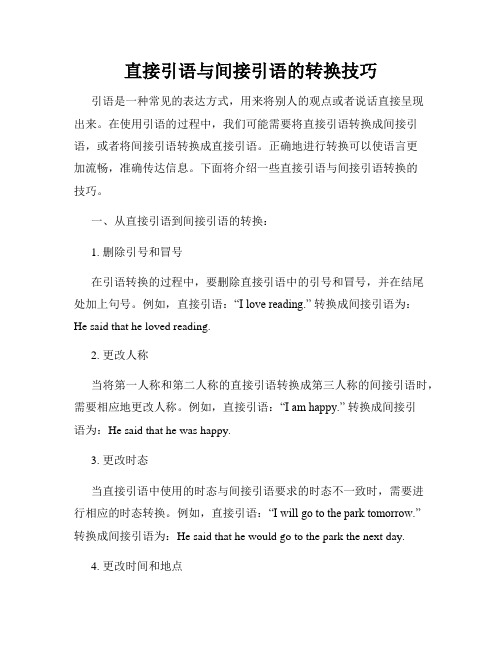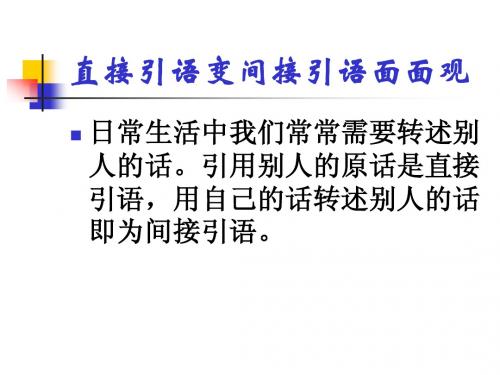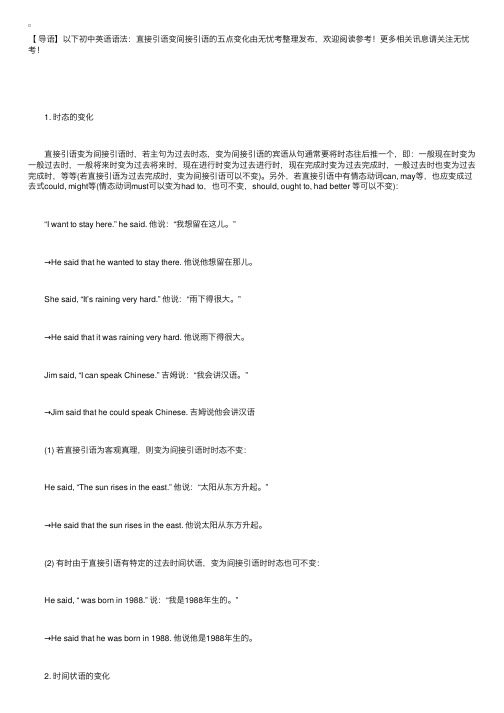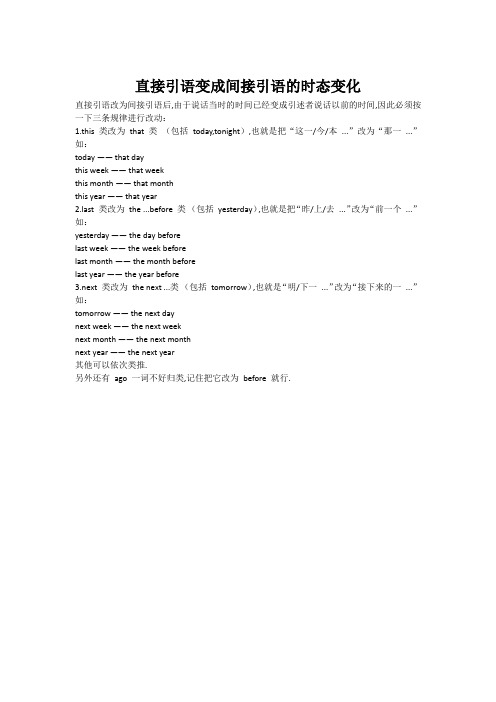英语中直接引语变为间接引语的规则
直接引语变间接引语的规则

六、 祈使句转述(直接命令转述成间接命令 asked sb to do sth/adviced sb to do sth)
直接命令、请求
间接命令、请求
I said politely, ’please make I asked them politely to make less
直接引语变间接引语的规则
一、 时态变化
直接引语 一般现在时 现在进行时 一般过去时 现在完成时
间接引语 一般过去时 过去进行时 过去完成时 过去完成时
二、 情态动词
直接引语 Can May Will Shall Might must
间接引语
Could Might Would Should Had Had to/ must
七、 转述一个肯定句用 said,转述问句用 asked
直接命令、请求
间接命令、请求
I went to the park.’ Tom said.
Tom said that he had gone to the park.
Did you go to the park ?’Tom Tom asked if I had gone to the park. said.
四、 Yes or no 问句转述(问句在被转述以后变为了陈述句,一定注意 ask ,if 后面紧跟 着是个这句话的主语。)
直引语 I said, ’can I help you?’
间接引语 I asked if I could help him/her.
She said to us,’ Did you feel cold?’
He said, ’Are your hands cold?’
直接引语与间接引语的转换技巧

直接引语与间接引语的转换技巧引语是一种常见的表达方式,用来将别人的观点或者说话直接呈现出来。
在使用引语的过程中,我们可能需要将直接引语转换成间接引语,或者将间接引语转换成直接引语。
正确地进行转换可以使语言更加流畅,准确传达信息。
下面将介绍一些直接引语与间接引语转换的技巧。
一、从直接引语到间接引语的转换:1. 删除引号和冒号在引语转换的过程中,要删除直接引语中的引号和冒号,并在结尾处加上句号。
例如,直接引语:“I love reading.” 转换成间接引语为:He said that he loved reading.2. 更改人称当将第一人称和第二人称的直接引语转换成第三人称的间接引语时,需要相应地更改人称。
例如,直接引语:“I am happy.” 转换成间接引语为:He said that he was happy.3. 更改时态当直接引语中使用的时态与间接引语要求的时态不一致时,需要进行相应的时态转换。
例如,直接引语:“I will go to the park tomorrow.”转换成间接引语为:He said that he would go to the park the next day.4. 更改时间和地点在转换引语时,需要根据语境调整时间和地点的说法。
例如,直接引语:“I am going to the cinema tonight.” 转换成间接引语为:She said that she was going to the cinema that night.5. 更改连接词在转换引语的过程中,需要使用适当的连接词来引导引语和引语转换之间的关系。
例如,直接引语:“I think he is a good teacher.” 转换成间接引语为:She said that she thought he was a good teacher.二、从间接引语到直接引语的转换:1. 恢复引号和冒号在将间接引语转换成直接引语时,需要加上引号和冒号,并删除句末的句号。
直接引语变间接引语的转换

直接引语变间接引语的转换:〔一〕如何变人称:口诀:一随主,二随宾,第三人称不更新。
“一随主〞是指在直接引语变间接引语时,如果从句中的主语是第一人称或被第一人称所修饰。
从句中的人称要按照主句中主语的人称变化。
如:She said. “My brother wants to go with me. 〞→She said her brother wanted to go with her.“二随宾〞是指直接引语变间接引语时,假设从句中的主语及宾语是第二人称。
或被第二人称所修饰。
从句中的人称要跟引号外的主句的宾语一致。
如果引号外的主句没有宾语。
也可以用第一人称。
如:He said to Kate.“How is your sister now?〞→ He asked Kate how her sister was then.“第三人称不更新〞是指直接引语变间接引语时。
如果从句中的主语及宾语是第三人称或被第三人称所修饰,从句中的人称一般不需要变化。
如:Mr. Smith said, “Jack is a good worker.〞→ Mr. Smith said Jack was a good work er.〔二〕时态的变化①如果引述动词为现在时态,间接引语的动词可以保持原来的时态。
He says, “I have been writing a novel.〞------- He says that he has been writing a novel.He says:"that's all right."----- He says that's all right.②如果引述动词为过去时态,间接引语中的时间就要往后推,即现在时间推至过去时间,过去时间推至过去的过去,将来时间推至过去将来时间。
具体变化见下表:She said:"I am a student."------- She said (that) she was a student.(一般现在时变成一般过去时)She said:"He will go to see his friend"-----She said he would go to see his friend.(一般将来时变成过去将来时) Tom said:"I am going to play basketball tomorrow."The teacher said, “You are doing OK.〞老师说:“你们干得很不错。
直接引语变间接引语口诀五则

••直接引语变间接引语口诀五则1.变陈述句,去掉引号加that, 时态全向后退过;人称变化看主语,其它变化背表格。
2.变一般疑问句,去掉引号请“if”,陈述语序要记住;时态人称后状语,全都要变别马虎。
3.变特殊疑问句,直接引语去引号,原句问词作引导;陈述语序助去掉,其它变化别漏掉。
4.变祈使句,动前加to去引导,tell, ask句型套;否认祈使一样变, not就往to前靠。
5.直转间人称变,一主二宾三不变。
【特别提示】“一主”是指直接引语为第一人称变间接引语时,须与主句的主语在人称和数上坚持一致;“二宾”是指直接引语是第二人称变间接引语后需与主句的宾语在人称上一致;“三不变”是指直接引语中的代词若是第三人称,变为间接引语时则不变.直接引语变为间接引语时,若主句为过去时态,变为间接引语的宾语从句通常要将时态往后推一个,即。
如:一般现在时变为一般过去时,一般将来时变为过去将来时,现在进行时变为过去进行时,现在完成时变为过去完成时,一般过去时也变为过去完成时,等等(若直接引语为过去完成时,变为间接引语可以不变)。
另外,若直接引语中有情态动词can, may等,也应变成过去式could, might等(情态动词must可以变为had to,也可不变,should, ought to, had better 等可以不变)。
如:“I want to stay here.”he said. 他说。
如:“我想留在这儿。
”→He said that he wanted to stay there. 他说他想留在那儿。
She said, “It’s raining very hard.”他说。
如:“雨下得很大。
”→He said that it was raining very hard. 他说雨下得很大。
Jim said, “I can speak Chinese.”吉姆说。
如:“我会讲汉语。
”→Jim said that he could speak Chinese. 吉姆说他会讲汉语注意:(1) 若直接引语为客观真理,则变为间接引语时时态不变。
直接引语变间接引语注意事项

二、如何变时态: 直接引语在改为间接引语时、时态需要做相应的调整。 1) 一般现在时→一般过去时态; She said:” I am a student. ” → She said (that) she was a student. 2)一般将来时→过去将来时 She said, "He will go to see his friend.” →She said he would go to see his friend。 Tom said,” I am going to play basketball tomorrow.” → Tom said he was going to play basketball tomorrow.
Jack said. “I was doing chores when Tom came to see me” →Jack said he was doing chores when Tom came to see him.
③直接引语中有具体的过去某年、某月、某日作状语, 变为间接引语时,时态不变。如:
He said, ”I want to go swimming now. ” → He said he wanted to go swimming then.
地点状语,尤其表示方向性的, here 变 there
The teacher said ,“ You should come here at 7:00.” →The teacher said I should go there at 7:00.
练习 1. She said :”I am six years old.”
2. John said: ”I’ll be back tomorrow. ”
初中英语语法:直接引语变间接引语的五点变化

【导语】以下初中英语语法:直接引语变间接引语的五点变化由⽆忧考整理发布,欢迎阅读参考!更多相关讯息请关注⽆忧考! 1. 时态的变化 直接引语变为间接引语时,若主句为过去时态,变为间接引语的宾语从句通常要将时态往后推⼀个,即:⼀般现在时变为⼀般过去时,⼀般将来时变为过去将来时,现在进⾏时变为过去进⾏时,现在完成时变为过去完成时,⼀般过去时也变为过去完成时,等等(若直接引语为过去完成时,变为间接引语可以不变)。
另外,若直接引语中有情态动词can, may等,也应变成过去式could, might等(情态动词must可以变为had to,也可不变,should, ought to, had better 等可以不变): “I want to stay here.” he said. 他说:“我想留在这⼉。
” →He said that he wanted to stay there. 他说他想留在那⼉。
She said, “It’s raining very hard.” 他说:“⾬下得很⼤。
” →He said that it was raining very hard. 他说⾬下得很⼤。
Jim said, “I can speak Chinese.” 吉姆说:“我会讲汉语。
” →Jim said that he could speak Chinese. 吉姆说他会讲汉语 (1) 若直接引语为客观真理,则变为间接引语时时态不变: He said, “The sun rises in the east.” 他说:“太阳从东⽅升起。
” →He said that the sun rises in the east. 他说太阳从东⽅升起。
(2) 有时由于直接引语有特定的过去时间状语,变为间接引语时时态也可不变: He said, “ was born in 1988.” 说:“我是1988年⽣的。
” →He said that he was born in 1988. 他说他是1988年⽣的。
直接引语变成间接引语的时态变化

直接引语变成间接引语的时态变化
直接引语改为间接引语后,由于说话当时的时间已经变成引述者说话以前的时间,因此必须按一下三条规律进行改动:
1.this 类改为that 类(包括today,tonight),也就是把“这一/今/本...”改为“那一...”如:
today —— that day
this week —— that week
this month —— that month
this year —— that year
st 类改为the ...before 类(包括yesterday),也就是把“昨/上/去...”改为“前一个...”如:
yesterday —— the day before
last week —— the week before
last month —— the month before
last year —— the year before
3.next 类改为the next ...类(包括tomorrow),也就是“明/下一...”改为“接下来的一...”如:
tomorrow —— the next day
next week —— the next week
next month —— the next month
next year —— the next year
其他可以依次类推.
另外还有ago 一词不好归类,记住把它改为before 就行.。
直接引语变间接引语口诀

直接引语变间接引语口诀一、当直接引语为陈述句,变成间接引语的“顺口溜”是:去掉引号加that,人称变化要灵活,时态向后退一步,状语变化按规则。
She said,“My brother doesn't want to go there.”→She said that her brother didn't want to go there.二、当直接引语为一般疑问句,变成间接引语的“顺口溜”是:去掉引号加if,陈述语序要记住,时态人称和状语,小心变化别马虎。
I asked her,“Do you study English here?”→I asked her if she studied English there.三、当直接引语是特殊疑问句,变成间接引语的“顺口溜”是:直接去引号,陈述莫忘掉,小心助动词,丢它最重要。
“What do you want?”he asked me. →He asked me what I wanted.四、当直接引语是祈使句,变成间接引语的“顺口溜”是:去掉引号要加to, ask,tell须记住,直引若是否定式,not加在to前部。
The teacher said to her mother,“Please give me the book.” →The teacher told her mother to give her the book.五、对于人称变化,要求学生们记住的“顺口溜”是:第一人称看主语,第二人称看宾语,宾语若是不存在,活用代词I,my,me。
He said to her,“Are you interested in English?”→He a sked her if she was interested in English.The teacher said,“Where have you been?”→The teacher asked me(us) where I(we) had been.六、时态对应表:直接引语时态间接引语时态一般现在时→ 一般过去时一般将来时→ 过去将来时现在进行时→ 过去进行时一般过去时→ 过去完成时现在完成时→ 过去完成时(过去完成时时态不变)情态动词也要变成相应的过去式:can could; may might; must must/had to一般疑问句whether/if 引导的宾语从句“Is this your umbrella, Mary?” asked John.John asked Mary if that was her umbrella.特殊疑问句wh-词引导的宾语从句“Mary, when will you return John asked Mary when she wouldme the book?” asked John return him the book主句动词为一般现在时或现在完成时从句动词时态不变She often says, “All men and women She often says that all men and womenar e equal under the law.”are equal under the law.主句动词为一般过去时一般现在时一般过去时“I know it,” he said.He said that he knew it现在进行时过去进行时“I’m making coffee for you all,” she said.She said she was making coffee for us all.现在完成时过去完成时“I have seen her before,” said he. He said he had seen her before.一般过去时过去完成时“I saw her last Monday,” he said.He said he had seen her the previous Monday过去完成时过去完成时“ Do you know Rick had been ill in bed.Jack asked if I knew Rick had been ill in bedfor many days till he died?” Jack asked for many days till he died一般将来时过去将来时He said: “We shall start tomorrow He said they would start the next day由直接引语转变为间接引语,下列情况时态不变:1. 不变的真理The teacher said to the students, “Water freezes when the temperature falls below 0℃.”→ The teacher told the students that water freezes when the temperature falls below 0℃.2. 经常的习惯:He said to the doctor, “I smoke two packs every day.”→ He told the doctor that he smokes two packs every day.3. 历史事件:The teacher said, “World War Ⅱended in 1945.”→ The teacher said that World War Ⅱ ended in 1945.4. 部分情态动词,如must, ought to, used to, had better等:She said to me: “You must hurry up.”→ She said that I must hurry up.练习题;1. Jack said to me, “You look worried today.”Jack told me that ___ worried ___.A. he looks…todayB. you look…todayC. we looked…that dayD. I looked…that day2. We said to her, “They’re walking through the street now.”We told her that ___ through the street ___.A. we were walking…thenB. you are walking…nowC .they were walking…then D. they walking…now3. Mr Black said, “I have walked a long way this week.”Mr Black said that __ a long way __.A. I had walked…last wee kB. he had walked…that weekC. I walked…last weekD. he has walked…this week4. The man thought, “I shall take it back tomorrow.”The man thought that __ take it back ____.A. I shall…tomorrowB. I shall…the next dayC. he should…tomo rrowD. he wo uld …the next day5. They said to us, “Are you afraid to leave this house ?”They asked us ____ afraid to leave _____ house.A. that were we…thisB. that we were…thatC. if were we …thisD. if we were…that6. Jane said, “What did he hear about a week ago?”Jane asked ____ about _____.A. that he heard…a week ag oB. what he had heard…the week beforeC. what he had herd… a week agoD. if he heard…the week ago7. She asked, “Whose house will he break into next time ?”She asked whose house ____ break into __A. will he…next timeB. would he…the next timeC. he would…the next timeD. he will…next time8. Jack said to her, “Where do you spend your holidays?”Jack asked her where ____ holidays.A. she spent herB. you spend yourC. she spend herD. you spent your9. Black asked me, “ Why haven’t you left here yet?”Black asked me why ____ yet.A. I hadn’t left thereB. I haven’t left hereC. hadn’t I left thereD. haven’t I lef t here10. The teacher asked her, “Does the sun rise in the east ?”The teacher asked her ___ the sun ___ in the east.A. if…riseB. if…risesC. whether…roseD. whether did …rise。
- 1、下载文档前请自行甄别文档内容的完整性,平台不提供额外的编辑、内容补充、找答案等附加服务。
- 2、"仅部分预览"的文档,不可在线预览部分如存在完整性等问题,可反馈申请退款(可完整预览的文档不适用该条件!)。
- 3、如文档侵犯您的权益,请联系客服反馈,我们会尽快为您处理(人工客服工作时间:9:00-18:30)。
英语中直接引语变为间接引语的规则
在英语语法中,直接引语和间接引语之间的相互转换是个重点也是个难点。
但是在初中英语考试中,通常考查直接引语变为间接引语。
因此,我将这个语法知识点整理如下:
一,四种类型
1,直接引语为陈述句,变为间接引语时用that 引导,that 也可以省略。
2,直接引语为一般疑问句,变为间接引语时用if 或whether 引导,间接引语部分要用陈述句语序。
3,直接引语为特殊疑问句,变为间接引语时用原来的疑问词引导,间接引语部分要用陈述语序。
4,直接引语为祈使句,变为间接引语时要变为由动词不定式短语构成的复合结构。
二,三大变化
1,人称的变化:直接引语变间接引语时,人称的变化遵循“一主,二宾,三不变”的原则。
“一主”指第一人称应改为与主句主语一致的人称;“二宾”指第二人称应改为与主句宾语一致的人称;“三不变”指第三人称保持不变。
2,时态的变化:直接引语变间接引语时,如果主句谓语动词是一般现在时或一般将来时,间接引语的时态通常不变;若主句谓语动词是一般过去时,间接引语常变成相应的过去时态。
即:一般现在时变为一般过去时;现在进行时变为过去进行时;一般将来时变为过去将来
时;一般过去时变为过去完成时;若转述的内容为客观真理,时态则不变。
3,根据需要的其他变化:指示代词有this变为that,these变为those 等;时间状语有today变为that day,yesterday变为the day before,tomorrow变为the next / following day,the day after tomorrow 变为two days later / in two days' time 等;地点状语有here 变为there 等;动词有come 变为go 等。
